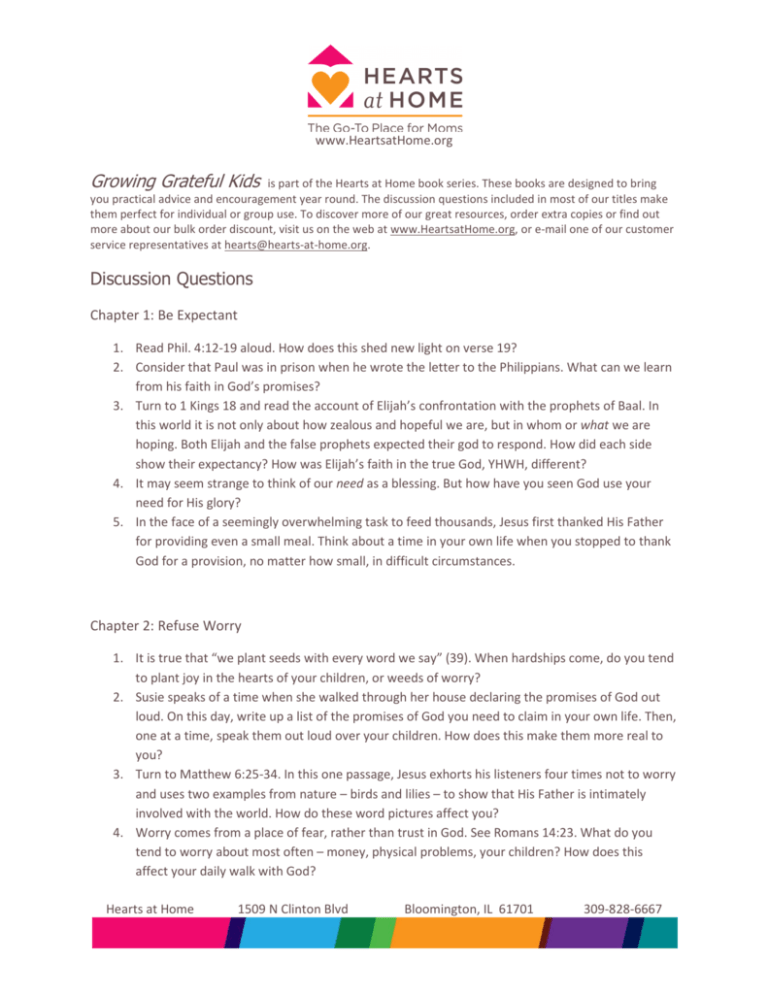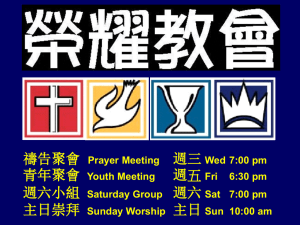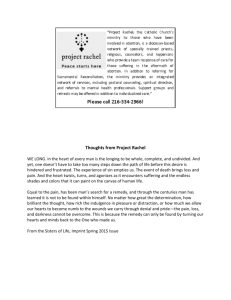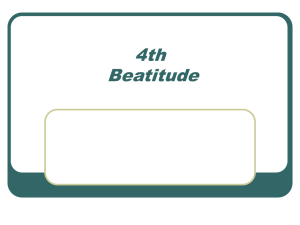Discussion Questions
advertisement

www.HeartsatHome.org Growing Grateful Kids is part of the Hearts at Home book series. These books are designed to bring you practical advice and encouragement year round. The discussion questions included in most of our titles make them perfect for individual or group use. To discover more of our great resources, order extra copies or find out more about our bulk order discount, visit us on the web at www.HeartsatHome.org, or e-mail one of our customer service representatives at hearts@hearts-at-home.org. Discussion Questions Chapter 1: Be Expectant 1. Read Phil. 4:12-19 aloud. How does this shed new light on verse 19? 2. Consider that Paul was in prison when he wrote the letter to the Philippians. What can we learn from his faith in God’s promises? 3. Turn to 1 Kings 18 and read the account of Elijah’s confrontation with the prophets of Baal. In this world it is not only about how zealous and hopeful we are, but in whom or what we are hoping. Both Elijah and the false prophets expected their god to respond. How did each side show their expectancy? How was Elijah’s faith in the true God, YHWH, different? 4. It may seem strange to think of our need as a blessing. But how have you seen God use your need for His glory? 5. In the face of a seemingly overwhelming task to feed thousands, Jesus first thanked His Father for providing even a small meal. Think about a time in your own life when you stopped to thank God for a provision, no matter how small, in difficult circumstances. Chapter 2: Refuse Worry 1. It is true that “we plant seeds with every word we say” (39). When hardships come, do you tend to plant joy in the hearts of your children, or weeds of worry? 2. Susie speaks of a time when she walked through her house declaring the promises of God out loud. On this day, write up a list of the promises of God you need to claim in your own life. Then, one at a time, speak them out loud over your children. How does this make them more real to you? 3. Turn to Matthew 6:25-34. In this one passage, Jesus exhorts his listeners four times not to worry and uses two examples from nature – birds and lilies – to show that His Father is intimately involved with the world. How do these word pictures affect you? 4. Worry comes from a place of fear, rather than trust in God. See Romans 14:23. What do you tend to worry about most often – money, physical problems, your children? How does this affect your daily walk with God? Hearts at Home 1509 N Clinton Blvd Bloomington, IL 61701 309-828-6667 www.HeartsatHome.org Chapter 3: Practice Restraint 1. When in your life have you “ruined the Twinkie” by grabbing it too early? 2. Read Prov. 25:28. Is there an area of your life where you lack self-control and are vulnerable to Satan’s schemes? 3. Sometimes fasting is a good way to refocus on God. Think of an activity you like to do daily, and try to go three days without it. How difficult is it to practice self-control in that area? What did you learn about your dependence on it? 4. When you think about your children, do you see them as indulged or disciplined? Why? 5. Read Galatians 5:22-25. How do you “keep in step with the Spirit” by practicing self-control? Chapter 4: Take Time To Play 1. Does your family take time to laugh and have fun? Why or why not? 2. How can playing with your children teach them about the love of the Father? 3. Turn to Psalm 104 and read v. 25-26. Here it is stated that YHWH’s purpose in creating the leviathan was simply to have it “play” in the sea. How does this affect your view of the Creator, Who created something mainly to enjoy? 4. Read through the meanings of the Hebrew word anag again. How do you pamper yourself in, be happy about, and make sport of things in your walk with Christ? 5. In Philippians 3:1, Paul tells believers to “rejoice in the Lord!” How does the rest of this passage give us a reason to rejoice? 6. When do you most often feel the joy of the Father in your life? Chapter 5: Develop Compassion 1. It can be easy to have compassion on people who look and think like us. Read Exodus 2:1-9 and look for Pharaoh’s daughter’s compassion on Moses. In your own life, how do you take steps to care for people who are radically different from you? 2. What do you teach your children about being compassionate? 3. Think of a time when someone you didn’t know had compassion on you. How did that affect your day? Week? 4. Read Luke 10:30-37. In this parable, what sets the Samaritan apart is not his ethnicity but his visible compassion. Why do you think he was so moved to help a stranger? 5. Take a few minutes to pray that God will show you how to be compassionate in the coming week. Hearts at Home 1509 N Clinton Blvd Bloomington, IL 61701 309-828-6667 www.HeartsatHome.org Chapter 6: Ask For Wisdom 1. Read James 1:5, looking at each word in turn. Each day how often do you ask God for wisdom when you don’t know what to do? 2. Write down three situations in your life right now where you need wisdom. 3. Susie writes that sometimes God will use a mentor figure in our life to speak wisdom to us. How do you respond when this happens – with pride and anger or with humility and gratitude? Why? 4. When do you make an effort to teach your children about wisdom/wise living? 5. Examine the four reaction filters listed in this chapter. Which ones are you most prone ? How can you take steps to avoid falling back on them? 6. Turn to Proverbs 2:1-5. Why is wisdom described as a means to knowing God, and finding “the knowledge of God”? Chapter 7: Live Humbly 1. Why is it so important to live humbly before our children and others? See Daniel 10:12. 2. Susie writes that “it’s dangerous to have a strong sense of your gifts without a humble dependence on God to keep you on track” (109). Why do you think this is true? What difficulties can arise from mighty gifts and a proud heart? 3. The theme of planting seeds shows up in this chapter (see chapter 2). How can we as parents “plant seeds of humility” in the children we raise? 4. What is the connection between humbling ourselves before God, and God lifting us up? 5. Read Proverbs 29:23. What does it mean for a humble person to retain honor? Chapter 8: Embrace Contentment 1. How do you rob yourself by wishing your life was somehow different? 2. Who in your life models contentment regardless of the circumstance? What can you seek to learn from their peace? 3. Meditate on Psalm 4. What verses stand out to you? What does this show you about your own search for contentment? 4. How often do you pray for your children to experience holy contentment? 5. At the beginning of this chapter, Hebrews 13:5 is referenced. Read Hebrews 13:5-6. How does this give you a better picture of the author’s exhortation to “be content”? 6. Turn to page 129 and read the section titled, “Count Your Blessings.” Pray that God will show you contentment even when the blessings listed change or decrease. Hearts at Home 1509 N Clinton Blvd Bloomington, IL 61701 309-828-6667 www.HeartsatHome.org Chapter 9: Teach Forgiveness 1. 2. 3. 4. 5. Discuss the difference between forgiving someone and forgetting what they’ve done. Read Psalm 130. How does the psalmist connect forgiveness with the fear of the Lord? Why is it important to teach our children how to receive forgiveness? When is it hardest for you to forgive a sin committed against you? Why? Read Psalm 51. What does David mean when he writes, “Against You, You only, have I sinned”? Chapter 10: Look Deeper 1. Think of a time when you saw past a child’s rebellious behavior and realized what was going on in their heart to cause it. What did you learn? How did this help you? Use Proverbs 20:5 as a reference. 2. Susie writes about not letting your child walk away with a “closed spirit.” How can you discipline him or her firmly while still being loving and respectful? 3. Our children often act as a mirror, showing habits and behaviors we had at that particular age. How can your own experiences and memories from childhood influence the way you react to your child’s behavior? 4. The act of looking deeper is not only emotion-based, but physically-based as well. Read Isaiah’s physical description of the Messiah in Isaiah 53:2. What does this tell you about the importance of Jesus’ outward appearance? Chapter 11: Pray Boldly 1. How do you react to the exhortation from this chapter to pray bold prayers? Is there fear or is there joy? Why? 2. Susie writes in this chapter of a time when her oldest son Jake, by faith, thanked God for his new bedroom things, though money was tight. How do your children pray boldly in this way? 3. Discuss the tension between praying boldly and trusting God’s will with Nehemiah’s words in Nehemiah 1-2 as a model (specifically 2:4, 19-20). 4. What are some things you and your children can take to God and trust Him with this week? See Malachi 3:10. Hearts at Home 1509 N Clinton Blvd Bloomington, IL 61701 309-828-6667 www.HeartsatHome.org Chapter 12: Speak The Truth 1. How do you “cultivate a peaceful home with truth as a centerpiece”? See John 14:27, Micah 5:5. 2. When is it easiest for you to accept correction? Why? How can you apply that to every situation that calls you to correction? Use Jesus’ words in Luke 18:15-20 and Paul’s words in Galatians 2:11 to help you. 3. Sometimes it’s necessary to “speak truth” to each child in a different way. How do you tailor your correction to each child’s personality? 4. When it comes to running your home, do you tend to be a “peacekeeper” or a “peacemaker”? 5. Take a few minutes to reflect on how God has used the correction of a friend to grow you in a few areas of life. Chapter 13: Give A Blessing 1. How important is it to give a verbal blessing to your children? How do you find it affects them? 2. Imagine God the Father standing behind you, pouring out a special blessing just for you. What do you think He would be saying? See Psalm 16:3. What emotions come to mind? 3. Susie writes about the connection between the absence of a parent’s blessing and a troubled, angry teenager. How do you see the connection existing? 4. Examine Numbers 6:24-26, Romans 16:25-27, and Jude 24-25. When giving a blessing, what do you think is the most important element? Chapter 14: Look For The Victory 1. How do you celebrate or mark victories in your child’s life? 2. Susie writes about helping our children imagine what victory looks like in a given situation and give them tools to help them achieve it. Draw the distinction between this and the “name it and claim it” prosperity gospel, which is a distorting of Christ’s victory on the cross. 3. We often forget that the Christian life is a spiritual battle. Turn to Ephesians 6:10-17. What tools are listed here to help us gain the victory over Satan? 4. In earthly wars, it’s sometimes hard to predict which side will be victorious in the end. Read Ephesians 6:13 again; in Christ, we’ve already won our war. How does that knowledge affect your reading of this verse? 5. Sit down with each of your children and make a list of “I once was… but now I’m…” statements. Read them through together and celebrate God’s work in his or her life! Hearts at Home 1509 N Clinton Blvd Bloomington, IL 61701 309-828-6667 www.HeartsatHome.org Chapter 15: Give Grace 1. Why is it important to give ourselves grace in raising our children? 2. The enemy often attacks our small mistakes and turns them into giant failures. What are two lies from Satan you’ve believed regarding your parenting? How does Christ’s death on the cross remove them from your life? 3. Re-read Romans 8:1, this time out loud. How can you start to live in the light of this truth on a daily basis? 4. Read Luke 2:41-52. When Mary and Joseph lost track of the Son of God, they searched “anxiously” until they located Him. How did God give them grace in this situation? Chapter 16: Be Like Christ 1. How can you speak Christ into your family on a daily basis? 2. What qualities do you see in your children that reflect Jesus to you? How often do you encourage them by pointing it out? See Hebrews 3:13a, Matthew 19:13-15. 3. Susie exhorts us to “marvel at everything [H]e (Jesus) does. Because everything [H]e does is worth noting.” When do you take time to marvel at Jesus alongside your children? 4. Read John 13 and 17. Before His impending arrest, Jesus did two crucial things. He washed the feet of His disciples and He prayed, for them and for us. How can you model His servantleadership to your children today? Tomorrow? Next week? Hearts at Home 1509 N Clinton Blvd Bloomington, IL 61701 309-828-6667








